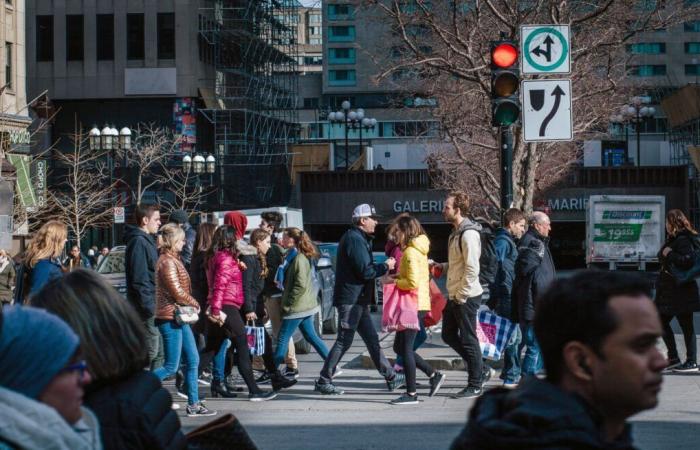“Catastrophe”, “shock”, “emergency”: beyond the confusion sown by the announcement of the virtual freeze on permanent immigration to Quebec last week, experts invite us to see the feeling of panic which is spreading among immigrants.
The CAQ has “played its own game” by politicizing immigration, two researchers also say. It is now difficult to act in complete “coherence” with the political discourse, while economic and humanitarian pressures are exerted on all sides, underlines for example Danièle Bélanger.
“It’s a catastrophe for these people who can no longer change their status,” remarks this professor at Laval University and holder of the Canada research chair on global migration dynamics. “There’s no mention of the effects of all this on people, as if it didn’t exist. We correct the Excel file a little and put it in the shredder,” she continues.
“We are talking about people who arrive here and play the game of immigration rules. This very often involves major life changes. Then, overnight, these rules change. I was able to observe a strong feeling of betrayal,” remarks Capucine Coustere.
Now a postdoctoral researcher at the Institute for Research on Migration and Society at Concordia University, Mme Coustere dedicated his thesis to studying transitions between temporary status and permanent residence. “The measures largely concern people who are already here and will increase delays for people who are temporary, with all that that implies,” she said, from the point of view of both the restriction of rights and precariousness.
Canadian exodus and “emergency”
Observers and the federal government have already pointed out that recent tightening of temporary and permanent immigration could increase the number of people who find themselves in a dead end: some will turn to seeking asylum, and Others could remain without status in the territory.
Still other immigrants, who have just lost the possibility of settling permanently — at least during the freeze — could also decide to leave for other Canadian provinces. The federal Minister of Immigration, Marc Miller, has also increased the French-speaking immigration target in the rest of the country.
This is already among the options that immigration lawyers submit to their clients, says immigration lawyer Patrice Brunet bluntly. “Obviously, I prefer that good candidates stay in Quebec, but it is up to the client to choose what is in their interest,” he notes in an interview. Changes in the rest of Canada “are less untimely”, and access to residence “much faster and safer”.
“At the moment, we treat the subject a lot like numbers, like merchandise inventories, but they are humans,” he also adds.
He and his team are currently conveying “a sense of urgency” to their “extremely stressed” clients, both individuals and businesses: “File as soon as you are eligible. It is unclear whether at midnight the program could be suspended indefinitely. »
Models that collide
However, the lawyer is not at all against an immigration model often called “two-step”, on the contrary. Obtaining permanent residence from abroad is a system “from another time” in his eyes.
There is in fact a growing share of permanent residents selected from the “pool” of temporary residents. And Jean-François Roberge, Quebec Minister of Immigration, has stated, in all the announcements, that he wants to strengthen this trend. The fact of “trying out” a job and a living environment in Quebec makes it possible to better “align” the demands of employers and the expectations of employees, says Mr. Brunet.
“To be temporary is to date before getting married. There’s less pressure and, if it doesn’t work, I always have the option to leave,” he says.
Professor Danièle Bélanger says she is “very divided” on this idea. Economic indicators indeed show that those who make this transition having already lived here cost the State less and have a better employment rate as well as higher salaries.
“But, from a human point of view, it is a migratory regime which has a high human cost,” she describes. Temporary immigrants, regardless of their program, will endure a lot to get to this “carrot” of permanent residence: “And what we see now is that this carrot is extremely volatile,” says M.me Bélanger.
Still some room for maneuver?
The three experts cannot help but note a certain “discrepancy” between the CAQ’s speech and real policies. “The party has excessively politicized immigration, and they are stuck with that,” said Mr.me Bélanger.
Capucine Coustere underlines an important paradox in this respect: the more the delays increase for changing from temporary to permanent, the more the total number of temporary immigrants will remain unchanged or will increase, she notes, which is “contrary to the repeated requests of Mr. .
There has been an explosion in the number of temporary workers in recent years: we could therefore expect that many would want to apply for permanent residence. “There is an overlap of the two [temporaire et permanent]. But, already at the last consultation, they did not want to take it into account. It’s not complicated to understand that there was already a bottleneck,” underlines Mme Bélanger.
This is perhaps where the feeling of “confusion”, even “inconsistency”, raised by several observers last week comes from, Capucine Coustere suggests: “We wonder to what extent they have a long-term vision. term if everything changes as soon as the political wind turns a little. And, on the other hand, do they really have room to maneuver? To what extent can they alienate all employers or the business community? »
She insists that the CAQ contributed to the “construction of immigration as a political problem to justify many other problems.” On the other hand, temporary immigration has also been “a magic wand to solve all the problems of labor, aging, lack of students in the region”.
A portrait that is ultimately “quite a caricature” on these two aspects, but in any case a “slightly alarming framing”, she concludes.






